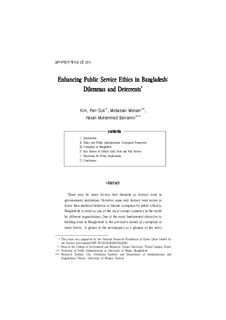Enhancing Public Service Ethics in Bangladesh: Dilemmas and Deterrents
Journal article
Permanent lenke
http://hdl.handle.net/11250/2475469Utgivelsesdato
2014-05-01Metadata
Vis full innførselSamlinger
- Publications [1488]
Originalversjon
in Journal of South Asian Studies vol. 19 no. 2 pp. 95-130 10.21587/jsas.2013.19.2.004Sammendrag
There may be many factors that diminish or destroy trust in governmental institutions. However, none may destroy trust easier or faster than unethical behavior or blatant corruption by public officials. Bangladesh is rated as one of the most corrupt countries in the world by different organizations. One of the most fundamental obstacles to building trust in Bangladesh is the pervasive nature of corruption at many levels. A glance at the newspapers or a glimpse of the news on the television shows that corruption issues continue to figure on the public agenda on a regular basis. Almost all the organs of the government are in the death grip of corruption and now seem to be approaching a stage where it might be impossible to be saved from total collapse. Many people feel helpless to address the problem of corruption and are gradually losing faith on the government. There are a number of the push factors (political pressure, corruption of the superiors, flawed recruitment process, insufficient allocation, poor remuneration, personnel systems, probe bodies, politicization, and education of the children) and the pull factors (culture of impunity, personal greed, mutual corruption pressure, systematic corruption, and complicated and cumbersome preassure in government offices) which are working as the key catalysts to the proliferation of corruption in Bangladesh. Many of the anti-corruption measures in Bangladesh do not get success, as the only initiatives taken to address the problem are through legal instruments.
